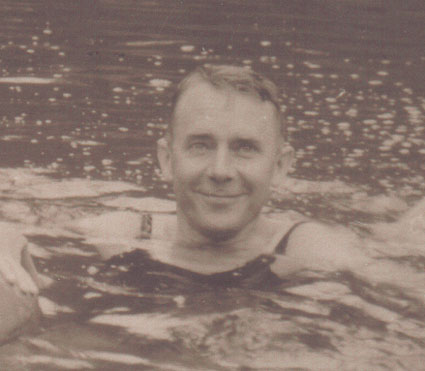Why did the Kempeitai kill my father
My father was a very sociable man, a fine and good husband for my mother and his three daughters had the most wonderful father they could have wished.
My father was a man who loved to have people around him, he listened and talked with almost every body. He loved his work in Indonesia on the plantations, loved to be most of the time in the open air, he had an excellent contact with the Indonesian people working on the plantation. In short, I remember my father as a happy and very friendly man, I shall always remember his smiling face and his friendly eyes full of humour.
It must have been horrible for my father to be locked up in a cell of the former Kempeitai prison Lowok Waru in Malang.
My friend Jos told me that one of her friends Zus Hageman had been in that prison too during the war, together with her father, she was then 17 years old. Jos gave me the address of her friend who lived in America, so I could write and ask her if she had seen or heard about my father or maybe she even knew him.
In the beginning of July 1994 I had a phone call from Mrs Hageman. She told me that she had known my father and that her father’s cell had been next to my father’s and that her cell was on the other side of her father’s cell. She told me that those cell’s were separated in two parts, one part was completely closed and the other part was encircled by bars. In the first part of the cell was a brick bed ( without a mattress) and a hole in the floor was the toilet, in the part of the cell behind the bars was a tap where men and women could wash themselves and their clothes. The food was extremely bad, men and women were regularly tortured, the prison had a special torture room.
Mrs. Hageman told me also: “All those who died in this prison were or killed through torture or they were shot and then buried behind the prison, all in separated graves without a name or any other information. Your father was still alive when I was transferred in 1944.”
Mrs.Hageman said that her father and mine had known each other before the war, he worked on a plantation not far from Sumber Sewu. Her father had asked my father to help him with a boat because he had wanted to escape to Australia with his family.
In 1995 my friend Agnes, who had been in Switzerland during World War Two, asked me if I would mind to write down what happened to my family and me during the war. I wrote it down on a few pages for her and two days later she phoned me and said; “You must absolutely go back to Indonesia”. And so we planned to go back to the beautiful country where we both grew up, for a whole month the next year, in 1996.
I wrote to the Dutch embassy in Jakarta and asked them if they saw a possibility for me to visit the prison in Lowok Waru in Malang. I wrote that since my father has no grave, I would like to visit the place where he died. I waited three months and then I wrote them again this time enclosing international answer stamps ( they don’t exist anymore) and again I waited three months for an answer.
Then I phoned the National ombudsman in The Hague, I was told to write them a letter and a copy of both letters I had sent to Jakarta.
Three days later I received a phone call from the Dutch embassy in Jakarta, a very nice lady told me that she was going to do her utmost best together with the office in Surabaya to get me a permit to visit the prison where my father was killed.
The next day I received a letter from the Ministry of Foreign Affaires telling me that they had asked the Dutch embassy in Jakarta to do their best for me but they also said that they couldn’t promise me anything.
Yes, I have received my permit to visit the Lowok Waru prison in Malang, and you will read more about it when I arrive in my Malang!

My father

